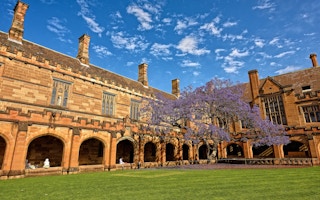Experts almost unanimously agree that if decisionmakers fail to address environment-related challenges such as global warming, resource scarcity and ecological destruction, the future looks bleak.
But unfortunately, as Christopher Wright, professor of organisational studies at the University of Sydney notes, a majority of business and government heads remain focused on financial priorities.
It is essential that future leaders are taught differently, says Wright.
Compared to teaching young people the scientific, technological, political, and economic aspects of sustainability, educating them on how to market the latest gadgets or navigate financial systems seems almost “completely irrelevant,” he says.
“We need to bring sustainability into our education and influence future leaders.”
These are the core objectives of the University of Sydney’s Sydney Sustainability Programme, which was launched in 2010 and offers postgraduate students the option of pursuing a Master’s Degree, Graduate Diploma or Graduate Certificate. The Masters programme takes one and a half years of full-time study to complete, and Australian residents have the option doing it part time as well.
Wright, who chairs the course’s programme committee, says that the initiative stands out from other postgraduate sustainability programmes in Australia—of which there are many—because of its multidisciplinary nature.
Many Australian universities that run postgraduate sustainability courses tend to do so in silos, he notes. The courses are usually housed in individual faculties and lean towards niches such as ecology, the built environment or international development.
“There’s nothing wrong with that,” Wright clarifies, adding that a more specialised approach is also easier because it makes it easier to allocate funds to, and administer the programme.
Sydney University’s course, therefore, is a unique and “brave initiative” because it is a “genuinely cross-disciplinary endeavour”, says Wright.
Though the programme is housed in the university’s Faculty of Science for administrative purposes, its core modules are taught by academics from seven disciplines: Geosciences; Life and Environmental Sciences; Medicine; Law; Business; and Physics.
The many components of the core syllabus mean it gives students useful subject matter knowledge about sustainability issues as well as qualitative and quantitative analysis skills, says Wright.
“What is distinct about our programme is that it is truly generalist at an introductory level,” he says. “The core units give students a solid foundation in sustainability and introduce them to a huge smorgasbord of issues and concerns.” Students can then choose topics they are passionate about and pursue them through elective modules and their final assignment, known as the capstone project.
“
You give students both general and specific knowledge, and they take it to solve today’s problems with innovative and real world solutions. As an educator, you can’t ask for much more than that.
Christopher Wright, professor of organisational studies, University of Sydney
Multidisciplinary and future-proof
Wright shares that this combination of a broad and specialised approach has many advantages.
For one thing, the multitude of subjects on offer accommodates the needs of students with a wide range of academic and professional aspirations.
Students in the same programme have been able to do capstone projects that include monitoring the health of endangered turtle populations, exploring the link between sustainability and company share prices, and developing biodegradable furniture, shares Wright.
“You give students both general and specific knowledge, and they take it to solve today’s problems with innovative and real world solutions,” reflects Wright. “As an educator, you can’t ask for much more than that.”
Beyond the classroom, the programme’s alumni have gone on to work for prestigious civil society, private sector, and policy organisations such as the World Wide Fund for Nature (WWF); Swedish furniture giant IKEA, and Switzerland-headquartered think-tank World Economic Forum.
Second, the programme is relatively future-proof thanks to the fact that staff from almost 10 different departments teach the programme; and between themselves, possess the expertise to keep up with the rapid technological and policy changes that are common in global sustainability issues.
Whether it is Australia’s constantly shifting energy policy debate or the breakneck speed at which technologies such as energy storage systems are evolving, “the skills and disciplinary knowledge of our academics mean we have the capacity to cover emerging challenges,” says Wright.
A global education
The programme’s diverse student population is also an asset, says Wright. The 30-odd students that enroll every year hail from Australia, North and South America, Europe, and Asia, and come from a variety of professional backgrounds.
“The one thing that the students have in common is their passion for sustainability and interest in how its various aspects intersect,” Wright says. He adds that because the programme brings together so many global perspectives, the skills it imparts are also globally relevant and applicable.
“We do draw on some Australian case studies in the courses, but sustainability is an inherently global topic,” Wright says. “Of any programme in the university, this is probably the most outward looking.”
In addition to the programme’s academic merits, students can also expect strong support from the university at every step of their journey, shares Wright. For instance, if students have trouble finding the right industry partner to collaborate with on their capstone projects, the capstone coordinator will help identify and establish a suitable connection.
The programme staff also regularly share professional and learning opportunities with students, and work with other research hubs in the university, such as the Sydney Environment Institute and the health-focused Charles Perkins Centre to create opportunities for students to explore new sustainability frontiers and showcase their work.
Ultimately, sustainability and related issues such as climate, food security geopolitics and poverties are the “big issues” that the world will face in the coming decades, says Wright.
“These are the most important things we should be concerned with as humans,” he says. “Frankly, I wouldn’t want to be studying anything else.”





















